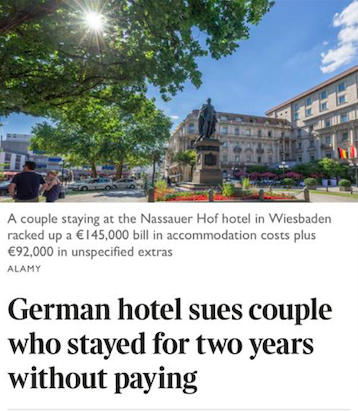This article appeared in yesterday's press. It describes a couple who managed to stay in a pretty upmarket hotel for over two years, for free. Only with a change in management is the hotel attempting to recoup over €200,000 from them.
But why would a hotel - or any other business, for that matter - allow a customer so much leeway? One answer we hear of quite frequently is the threat, real or implied, that the customer may write a less than complimentary review of the business. In its most basic form this used to be really quite common when Yelp strode the streets in the UK; Yelpers - as they called their reviewers - would often suggest that a restaurant booking from them would 'help' the business climb the Yelp rankings. The implication went further still, as far as 'not presenting a bill for the meal' would further enhance the business's chances of achieving the holy grail of multiple five-star reviews.
Individuals very often use reviews as a back-end negotiating chip when presented with all kinds of invoices. We even had to draft a statement for one hospitality client that was placed at their reception which ran along the lines of 'Please be sure to raise any issues during the course of your stay as we are unable to retrospectively adjust your invoice upon departure.'
Our advice to businesses? Never, ever, give in to such blackmail. By all means discount or refund if and when a customer has a valid complaint, but don't respond to 'I may have to write a negative review unless...' with anything other than 'That is your right, but please be aware that we respond to all our reviews, both positive and negative.'
What to do if such a review is posted?
Every site that hosts reviews has a procedure; Google's own starts here. Every one is different and some require considerable hoops to be jumped through. So our advice is to contact someone like HelpHound that has years of experience in guiding businesses - here's a case history from back in 2016 where the business made the national newspapers before we helped them get the offending and very damaging review taken down - their reservations had fallen to zero as a direct result.
In the case of Google there is a detailed appeals procedure: miss one step and your chances of having the review taken down reduce from small to vanishing. We conduct an average of one such appeal every month.
Respond
Respond, respond, respond. We cannot say it often enough. Respond to every review your business ever receives, positive or negative, short or long, well-written or not. Not just because it's good manners but because it sends a very strong message to anyone tempted to be even slightly loose with the truth. They will see that their review won't go unchallenged.
But don't take the reviewer on. Remember the audience for your response is not the reviewer (they will seldom retract or change their review) but your future potential customers. So don't write a response that will show you in anything but the most positive light. Be understanding and polite (even if you don't feel that way).
The importance of Moderation
As the case history referred to above shows, one well-crafted but inaccurate, potentially misleading or just plain unfair review can stop the clicks/calls/tills dead in their tracks, no matter how many positive reviews the business may have.
But it only applies to service businesses. Retail doesn't need 5 stars all the way. Service and the professions do. Consumers will buy a toaster that scores 4.0 out of 5.
But a medical professional - or a lawyer - or a financial adviser - or an estate agent? No way. Or at least not nearly as many as would if the score was 4.8 or better. Click-through rates and Google My Business reports have been confirming this for years. The higher the score the more clicks and calls. End of.
So what exactly does moderation achieve? It ensures that the reviews of the business in question provide maximum value for the consumer, by being as accurate and least likely to mislead as possible.
Note we don't say 'as positive' - because moderation rarely turns a negative review positive, even if the reviewer ends the process understanding why exactly their review was factually incorrect or potentially misleading (or, again, just plain unfair on the business). The best outcome, realistically, is that the reviewer decides not to post their review (although they retain the right to do so at any stage in the moderation process, which is handled by a 'real-life' HelpHound moderator, not some algorithm).
It is, in effect, insurance - for both the reviewer and the business - against misleading reviews of all kinds.



No comments:
Post a Comment
HelpHound is all about feedback, so please feel free to comment here...